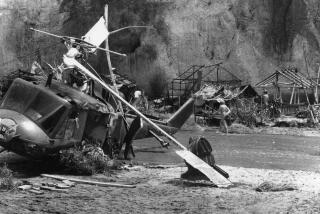But Issue Unquelled : ATV Makers Laud Honda Case Verdict
- Share via
Manufacturers of all-terrain vehicles on Wednesday hailed a San Diego jury verdict that cleared the Honda Motor Co. of blame for an accident involving one of its three-wheeled cycles, saying the decision validates their belief that the machines are safe if ridden properly.
“It reaffirms what we’ve been saying all along,” said Kurt Antonius, a spokesman for Honda in Gardena. “These vehicles are indeed safe and the majority of accidents occur as a result of driver behavior.”
But safety experts and attorneys who represent victims injured in ATV-related accidents said the 10-2 verdict--reached Tuesday--would not quell the controversy that has dogged the tricycles and predicted future litigation would yield different results.
“There are hundreds of these cases developing nationwide, and there will be hundreds more as long as these vehicles continue to cause the kinds of horribly crippling injuries we’ve seen,” said Steven Archer, a Los Angeles attorney affiliated with the ATV Litigation Group, a national organization of lawyers who handle cases involving the off-road machines. “Sooner or later, the tide is going to turn and we’re going to start winning them.”
Agreement Cited
Specifically, Archer and others cited a recent agreement negotiated by the U.S. Justice Department under which manufacturers have agreed to halt sales of the three-wheel models, buy back all tricycles in dealer inventories, place warning labels on vehicles and launch a nationwide safety campaign.
Jurors in the San Diego case were not informed of the agreement, which was based on the U.S. Consumer Product Safety Commission’s finding that the three-wheeled cycles are inherently unstable. Some lawyers predicted that the use of such evidence in future trials could mean the difference for plaintiffs seeking to win compensation for injuries.
“If that document--which pinpoints the ways in which these three-wheelers are defective--is introduced in future trials, there’s
no doubt it will have a significant impact on jury deliberations,” said Stuart M. Statler, a Washington attorney who served on the Consumer Product Safety Commission from 1978 to 1986.
Spokesmen for Honda and the three other ATV manufacturers, meanwhile, praised the verdict and said it exonerates their popular but controversial off-road tricycles.
Kawasaki Pleased
“Kawasaki is very pleased and feels that the decision in San Diego was based on reason and vindicates the company’s belief that the machine is safe when driven in a responsible manner,” said Doug Freeman, a spokesman for the Irvine-based Kawasaki Motors Corp. U.S.A. “Kawasaki, along with other members of the industry, is not afraid to continue to litigate cases like these.”
At Yamaha Motor Corp. in Cypress, spokesman Roy Watson said the verdict “reaffirmed” the company’s longstanding position that “there is no defect in the product and most accidents are caused by rider error.”
Philip Siracuse, general counsel for U.S. Suzuki Motor Corp., echoed that view and said he was particularly pleased that jurors said the parents of the injured San Diego boy were partly to blame for the accident: “It’s nice to see that parental responsibility in the minds of jurors is not dead,” he said.
ATVs have been widely criticized since their debut almost 20 years ago. Statistics show the vehicles have caused 20 deaths and 7,000 injuries a month for the last two years. About half of the victims of the estimated 880 deaths and 300,000 injuries since 1982 have been under 16.
Foot Became Trapped
The San Diego trial centered on a 1982 accident on a vacant lot in suburban Spring Valley that left Frank Cusimano Jr. brain damaged and partially paralyzed. Cusimano, 9 at the time, was a passenger on a Honda 110 ATC driven by an 8-year-old neighbor boy when his foot came off the foot peg and became trapped, causing him to be thrown from the vehicle. Now 15, Cusimano has a vocabulary of about 40 words, according to his attorney, Craig McClellan.
During the six-month trial, McClellan, who sought $6.8 million in damages from Honda, argued that the ATC 110 is inherently unstable and defective because of its three-wheeled configuration, balloon tires and lack of a key to regulate its use.
Ten of 12 jurors, however, decided there was no defect in the machine, barring any award of damages to Cusimano. Two jurors said in interviews that they believe the company had fulfilled its responsibility to warn consumers of the risks associated with the vehicles.
James V. Lacy, general counsel for the Consumer Product Safety Commission, conceded that rider behavior does play a role in causing injuries but said the machine itself is to blame as well.
Regulation Still Planned
“This verdict does not change the government’s plans to regulate ATVs,” Lacy said. “We still believe that the machines are inherently unstable and that the risks can be reduced to consumers by implementing the provisions of the government’s (agreement).”
Archer and other attorneys said most verdicts in ATV-related cases that go to trial have favored manufacturers, partly because it is a new area of litigation and because plaintiffs’ lawyers have been unable to obtain internal design documents they believe will enhance their claim that the three-wheelers are defective.
“As the tragic injury and death toll continues to grow, this will start to change and the manufacturers will start settling more cases,” Statler predicted. “I think they may look back on this as a Pyrrhic victory. Because unless the 1-million-plus (three-wheeled) vehicles that are out there are recalled, you are still going to have deaths and injuries and the litigation will only escalate.”






